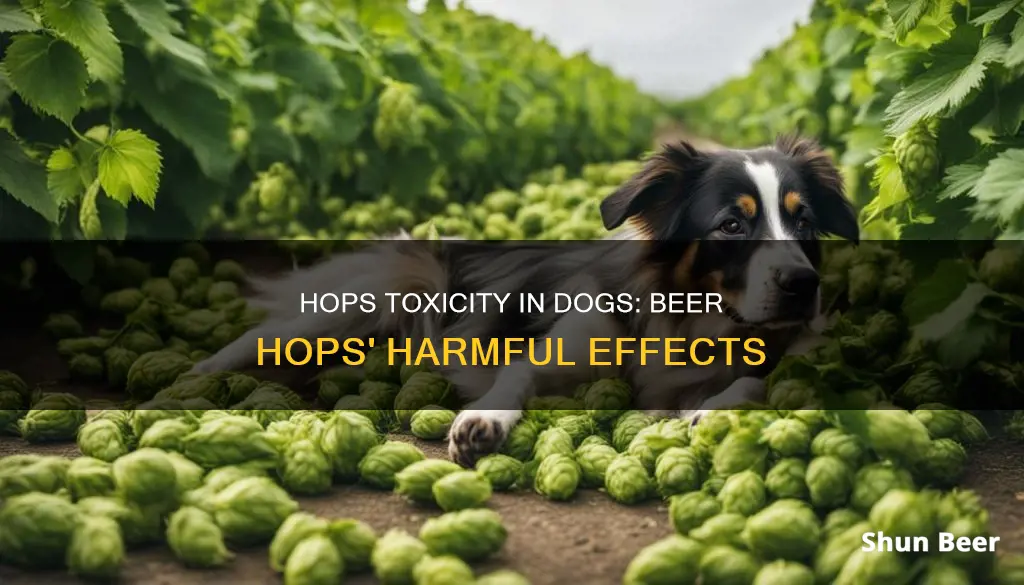
Beer hops are toxic to dogs and can cause a rapid rise in body temperature, which can be fatal. With the rise in home brewing, more dogs are at risk of hops toxicity, so it is important to be aware of the dangers and keep any brewing materials and ingredients out of reach.
| Characteristics | Values |
|---|---|
| Toxicity | Hops are toxic to dogs and can be dangerous both before and after they are used in the brewing process. |
| Symptoms | Malignant hyperthermia (rapid increase in body temperature), heavy breathing, restlessness, panting, vomiting, abdominal pain, seizures, rapid heart rate, high temperature, abnormal blood clotting, agitation, anxiety, diarrhoea. |
| Treatment | Induce vomiting, perform gastric lavage, administer activated charcoal, and/or administer enemas to reduce the toxic effects of the plant. Maintain a normal body temperature and use medications to control symptoms. |
| Prevention | Keep dogs away from hops plants and brewing areas. Do not dump used hops in compost heaps or leave them unattended. Place used hops in a sealed, dog-proof bin. |
What You'll Learn
- Hops toxicity can cause malignant hyperthermia in dogs, leading to a rapid rise in body temperature
- Ingesting hops can be fatal for dogs, causing death within hours if untreated
- Symptoms of hops poisoning include heavy breathing, increased heart rate, vomiting, and seizures
- Homebrewing increases the risk of dogs ingesting hops, which are toxic even in small doses
- The exact toxic component of hops is unknown but may be related to essential oils or resins in the plant

Hops toxicity can cause malignant hyperthermia in dogs, leading to a rapid rise in body temperature
Hops, or Humulus lupulus, is a plant used in the process of brewing beer. All versions of the plant, including hops plugs, hops pellets, whole leaf hops, hops extract, hops tea, and herbal creams, have been found to be toxic to dogs, sometimes even in small doses. Hops toxicity can cause malignant hyperthermia in dogs, leading to a rapid rise in body temperature.
Malignant hyperthermia is marked by a rapid increase in body temperature, heavy breathing, and restlessness. A dog's normal body temperature is around 101-102.5 °F (38.3-39.2 °C). With hops toxicity, their temperature can quickly rise above 105 °F or even 108 °F (40.6 °C or 42.2 °C). This rapid rise in body temperature can be life-threatening, as it can potentially result in permanent damage to the organs and brain or even death. Death has been reported in dogs poisoned by hops within 6 hours of ingestion if left untreated.
The exact mechanism of toxicity is not known, but it may be related to essential oils, resins, phenolic compounds, or nitrogenous constituents within the plant. Hops plugs, which are typically dried, tend to be more toxic than hops pellets. Symptoms of hops toxicity can start as early as 30 minutes after ingestion but may be delayed for up to 8 hours.
Breeds that are predisposed to malignant hyperthermia, such as Greyhounds, Labrador Retrievers, and Saint Bernards, are at a higher risk of developing severe hops toxicity. However, any breed of dog may be affected, and it is important to seek immediate veterinary treatment if you suspect your dog has ingested hops.
To prevent hops toxicity in dogs, it is crucial to keep any brewing materials or ingredients out of their reach. Used hops should be double-bagged and placed in a sealed, dog-proof garbage can.
Hops in Beer: Vegetable or Not?
You may want to see also

Ingesting hops can be fatal for dogs, causing death within hours if untreated
Ingesting hops can be fatal for dogs, causing death within hours if left untreated. The toxic component of hops is unknown, but it poses a very real and dangerous threat to dogs. Hops plugs, which are typically dried, are more toxic than hops pellets, but ingestion of either form can be enough to cause death within hours.
Hops toxicity in dogs can lead to malignant hyperthermia, an uncontrollable rise in body temperature that can be fatal. A dog's normal body temperature is around 101-102.5°F (38.3-39.2°C), but with hops poisoning, it can quickly rise above 105°F or even 108°F (40.6°C or 42.2°C). This rapid increase in body temperature can result in permanent damage to the organs and brain, and even death. Other symptoms of hops toxicity include increased respiratory rate, increased heart rate, restlessness, abdominal pain, seizures, vomiting, abnormal clotting, and anxiety.
The exact quantity of hops fatal to dogs is not known, but it is believed that any amount of hops should be considered poisonous to a dog. Some breeds, such as greyhounds, retrievers, and Saint Bernards, are more susceptible to hops poisoning, but any breed of dog may be affected.
If a dog exhibits any signs of hops toxicity, it is imperative to seek emergency veterinary treatment immediately. Aggressive treatment to prevent absorption and control the symptoms of toxicity is necessary. Inducing vomiting, performing gastric lavage, administering activated charcoal, and/or administering enemas are some of the treatments used to reduce the toxic effects of hops.
The best course of action is to prevent dogs from having access to hops at any time. Keep hops in a sealed container and properly dispose of any used hops to ensure the safety of your dog.
Beer Hops Allergy: What You Need to Know
You may want to see also

Symptoms of hops poisoning include heavy breathing, increased heart rate, vomiting, and seizures
The hops used in beer are toxic to dogs and can cause a range of symptoms, including heavy breathing, increased heart rate, vomiting, and seizures. This condition is known as hops poisoning or hops toxicity, and it can be life-threatening for dogs.
Hops poisoning in dogs is characterised by a rapid increase in body temperature, which can lead to malignant hyperthermia. A dog's normal body temperature ranges from 101-102.5°F (38.3-39.2°C). When a dog ingests hops, their temperature can rise above 105°F (40.6°C) or even 108°F (42.2°C), which is extremely dangerous and can be life-threatening. This increase in body temperature can occur within 30 minutes to eight hours of ingestion.
Symptoms of hops poisoning include heavy breathing and increased heart rate, which can be observed as panting or rapid breathing, and a racing heartbeat. These symptoms are accompanied by restlessness and agitation, indicating the dog's discomfort and distress. Hops poisoning can also cause vomiting, abdominal pain, and diarrhoea. In more severe cases, dogs may experience seizures and abnormal blood clotting.
It is important to note that any amount of hops ingestion can be considered poisonous to a dog. The exact quantity of hops fatal to dogs is not known, and even small doses can be toxic. Therefore, it is crucial to seek immediate veterinary treatment if you suspect your dog has ingested hops. The prognosis for severe hops toxicity is poor, even with immediate treatment. However, mild cases may result in recovery.
The Hoppy Truth: Do All Beers Have Hops?
You may want to see also

Homebrewing increases the risk of dogs ingesting hops, which are toxic even in small doses
Homebrewing has become an increasingly popular hobby, with an estimated 1.2 million people brewing beer in their homes in the United States. While this hobby is enjoyable for humans, it can pose a serious risk to dogs due to the presence of hops, a common ingredient in beer. Hops, or Humulus lupulus, are highly toxic to dogs, even in small doses, and can lead to a life-threatening condition called malignant hyperthermia.
Malignant hyperthermia is characterized by a rapid and uncontrollable rise in body temperature, which can exceed 105°F (40.6°C) and even reach 108°F (42.2°C) or higher. This elevated temperature can result in permanent damage to the organs and brain, or even death. Other symptoms of hops toxicity in dogs include increased respiratory rate, increased heart rate, restlessness, abdominal pain, vomiting, diarrhoea, seizures, and clotting disturbances.
The exact quantity of hops fatal to dogs is not known, and it is recommended that any amount of hops ingestion by a dog be treated as potentially poisonous. Certain dog breeds, such as Greyhounds, Labrador Retrievers, Saint Bernards, Pointers, Dobermans, Border Collies, and English Springer Spaniels, are more susceptible to hops poisoning, but any breed can be affected.
The toxicity of hops in dogs is not limited to the brewing process. Homebrewers should be cautious at all stages of the process, from storing hops before use to disposing of hops sediment after brewing. Dry, uncooked hops are bitter and less likely to be eaten by dogs, but used hops that have been boiled with beer have a more appealing flavour and should be properly disposed of to prevent accidental ingestion. This includes double bagging used hops and placing them in a sealed, dog-proof garbage can, rather than using them as garden mulch or compost, which can put neighbourhood dogs at risk.
In summary, the increasing popularity of homebrewing has led to an increased risk of dogs ingesting hops, which are toxic even in small amounts. It is crucial for homebrewers to take the necessary precautions to keep their dogs and neighbourhood dogs safe, by properly storing and disposing of hops and keeping them out of reach of curious canine companions.
Hops Beer: The Secret Behind the Bitter Buzz
You may want to see also

The exact toxic component of hops is unknown but may be related to essential oils or resins in the plant
Hops, or Humulus lupulus, is a plant used in the process of brewing beer. It is now common knowledge that hops are toxic to dogs, but the exact toxic principle is unknown. Research on hops toxicity in dogs is not extensive, but it is theorised that the toxic principle may be related to essential oils, resins, phenolic compounds, or nitrogenous constituents within the plant.
Hops plugs, which are typically dried, tend to be more toxic than hops pellets. This is because hops plugs are made from whole flowers that have been dried and compressed, while hops pellets are powdered and processed. However, ingestion of either form can be enough to cause death within just hours.
When hops are ingested by dogs, they can develop malignant hyperthermia, which is an uncontrollable rise in body temperature that can be fatal. A dog's normal body temperature is usually around 101-102.5°F (38.3-39.2°C), but with hops toxicity, it can quickly rise above 105°F (40.6°C) or even 108°F (42.2°C). This rapid increase in body temperature can lead to brain damage and serious internal organ damage. Other symptoms of hops toxicity include increased respiratory rate, increased heart rate, restlessness, panting, vomiting, abdominal pain, seizures, and abnormal clotting.
The exact quantity of hops fatal to dogs is not known, and some breeds, such as greyhounds, retrievers, and Saint Bernards, appear to be more susceptible to hops poisoning. However, any breed of dog may be affected, and any amount of hops should be considered poisonous to dogs.
Grow Your Own Hops for Beer: A Step-by-Step Guide
You may want to see also
Frequently asked questions
Yes, beer hops can be toxic to dogs and can cause malignant hyperthermia, which is a dangerous rise in body temperature. This can lead to brain damage, organ damage, and even death.
Signs of hops poisoning in dogs include heavy breathing, restlessness, vomiting, abdominal pain, seizures, rapid heart rate, and high temperature.
If your dog has ingested hops, it is important to act quickly and take them to a veterinary clinic or emergency pet hospital immediately. The higher the dog's temperature gets, the more dangerous their condition will become. Treatment for hops poisoning in dogs includes inducing vomiting, gastric lavage, administering activated charcoal, and/or administering enemas to reduce the toxic effects of the plant.







